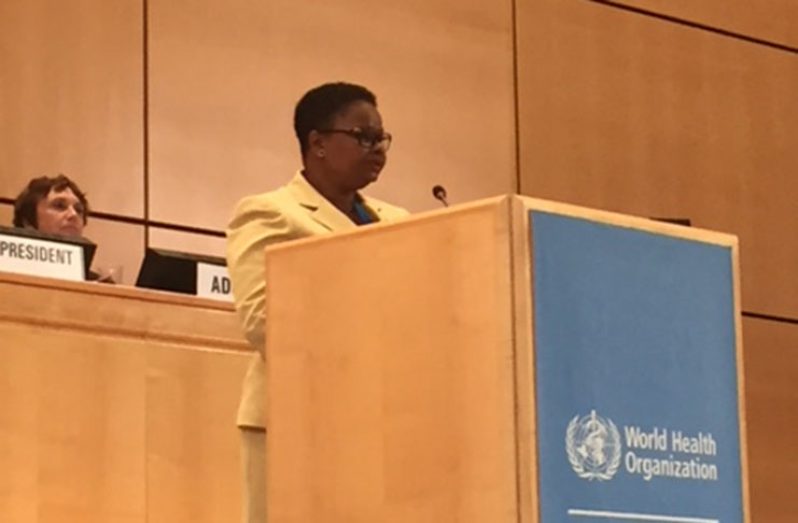-Min Lawrence tells World Health Assembly
Though the road ahead for Guyana in its quest to advance universal access to health and health coverage, is a daunting one, Public Health Minister Volda Lawrence, in her address to World Health Assembly, said the country is being guided by its 2020 Health Vision – a National Health Strategy for Guyana 2013-2020, which was developed following extensive consultation.
The 71st World Health Assembly is currently being held in Geneva, Switzerland. When Minister Lawrence addressed the assembly on Tuesday, she said recognising the importance of Universal Health Coverage, the Guyanese Government, in keeping with the Constitution, provides free healthcare services to all.
But while access to health services is on the increase, the Public Health Minister said one cannot ignore the many challenges the country’s healthcare sector faces. “There are still many challenges in relation to advancing towards universal access to health and universal health coverage, such as the segmentation and fragmentation of the systems and services, health financing deficits and inefficiencies, and health outcomes below expectation among others. More importantly, is our human resource gaps and efficiencies in the delivery of essential services.”
But that’s just a tip of the ice-berg Minister Lawrence said emphasising that the social determinants of health ought to be addressed to aid in the achievement of the sustainable development goals. “We are experiencing severe shortages in the numbers and range of skills offered to the public, including the number of nurses, doctors, and other health professionals. The number of doctors per population remains low, at fourteen doctors for ten thousand persons and these skills concentrated in the most populated areas and not sufficiently extended to the interior and rural areas of our country,” the Public Health Minister explained.
However, though admitting that the road ahead for Guyana is a challenging one, Minister Lawrence assured that country will be guided by Health Vision 2020.
The strategy was developed through a wide-ranging consultative process with key stakeholders from the Government, Civil Society, Private Sector, Local and International Non-Governmental Organisations and development agencies including the Pan American Health Organisation/ World Health Organisation (PAHO/WHO).
Its main two pillars are Universal Health and addressing the Social Determinants of Health.
These pillars, Minister Lawrence explained, are geared toward ensuring equitable access to medicines and other health technologies, providing equitable access people centered care, strengthened integrated health services delivery networks and competencies for other human resources for health.
Under the strategy, there is also a push for the enhancement of the health information system which will allow for evidence informed decision making, thereby contributing to improving the health status of individuals, families and communities.
The Public Health Minister also used the platform to call greater collaboration noting that lessons learnt and best practices can be shared among countries to ensure that Universal Health can be achieved.
Meanwhile, on the sideline of the World Health Assembly during another presentation, Minister Lawrence called on Member States to cognizant of the effects of climate change.
The threat climate change poses to countries worldwide is real, the Public Health Minister said as she put a question to her audience.
“Why do we have to still ask ourselves whether climate change is real?”
The direct and indirect effects negatively affect human development and well-being of all people, she posited. “Is it that we are looking at each other to act when we should be acting?”
She reminded that health systems are tested in the event of a natural disaster hence the need to take heed of the warnings. Reference was made to recent effects relating to climate change, experienced by Guyana. These included the overtopping of seawalls on the West Coast of Demerara which flooded several communities and forced the temporary closure of a community hospital.
Minister Lawrence said that the Guyana Government is aware of the impact that climate change can have on its people and economy. As such the administration is collaborating with the United Nations to develop a Green State Development Strategy (GSDS) which will essentially result in improved human well-being, reduce environmental risk and promote social equity for all Guyanese.
“We as countries have a choice. We can choose not to pay heed to this threat and maintain a business as usual attitude or we can choose to cultivate a mindset set that is premised on being innovative and establish public policies which are propitious, purposive and cogent to mitigate these adverse effects, particularly, on health,” Minister Lawrence stated.
She explained that Caribbean countries have been mandated to embrace climate change awareness, develop strategies and policies which will promote inclusive economic growth and improve multidimensional progress, noting, “This is likely to tackle vulnerability at the household and individual level.”
As such, she renewed the call for a consolidate effort that would result a unified approach to tackle this pervasive threat. The 71st World Health Assembly opened on Monday and will conclude on Saturday May 26.



.jpg)








